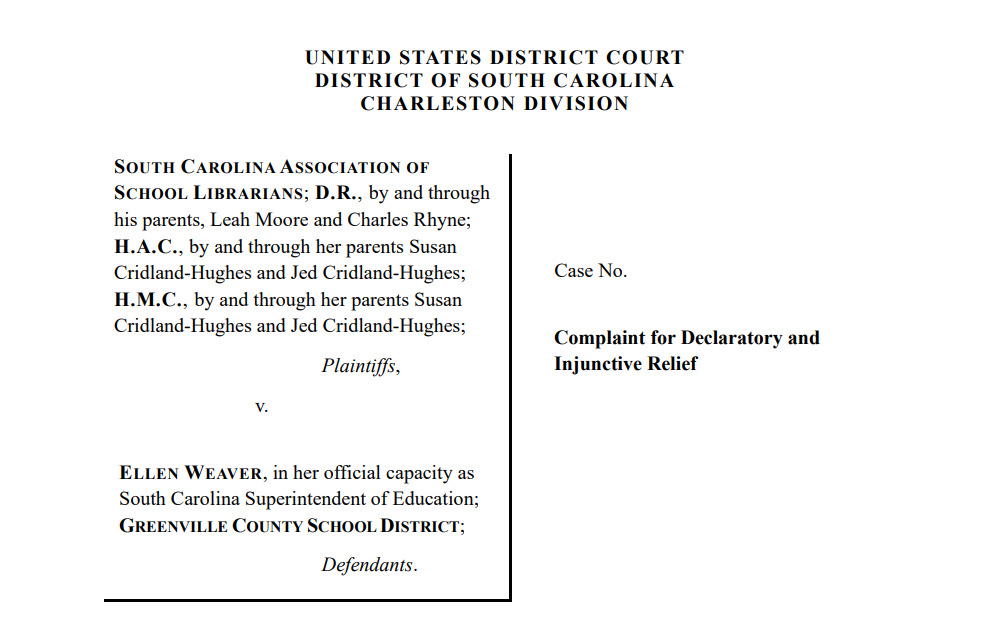South Carolina School Librarians Sue State Superintendent
South Carolina Association of School Librarians past president Jamie Gregory says the lawsuit is not political, it's fighting for the constitutional rights of students and librarians.

The courtroom continues to play a key role in the battle against censorship. Now, the South Carolina Association of School Librarians (SCASL) has entered the legal fray.
In a suit filed on October 7, SCASL and three unnamed students are the plaintiffs in a case against South Carolina Superintendent of Education Ellen Weaver and the Greenville County School District.
The plaintiffs “bring this action to challenge two pillars of Defendant Weaver’s statewide censorship regime,” the lawsuit states. Continuing:
“First, Plaintiffs seek relief from the portion of South Carolina Department of Education (SCDE) Regulation 43-170 that bans all classroom, library, and curricular materials that contain ‘descriptions or visual depictions of “sexual conduct,”’ regardless of whether the material appeals to the prurient interest, is patently offensive, or otherwise has educational, literary, artistic, political, or scientific value. See Ex. A (the “Regulation”). …
“Second, Plaintiffs challenge Defendant Weaver’s unilateral efforts ‘strangle the free mind at its source,’ W. Va. Bd. of Ed. v. Barnette, 319 U.S. 624, 637 (1943), by using her authority as State Superintendent to forcibly curtail students’ access to ideas that she politically opposes.”
Choosing to litigate requires considering the possible consequences, such as further attacks on librarians or retaliation from administrators or community members.
“That’s been a natural consequence of any of the advocacy we’ve engaged in since 2021 when we saw [censorship attempts] start to rise exponentially,” says SCASL immediate past president Jamie Gregory.
In the end, the SCASL executive board and members felt they had to pursue the case.
“Ultimately, we have a legal argument,” Gregory says. “It’s not political. We made it clear to our members that this is in no way a political attack or a partisan choosing of sides. We are simply dealing with the practical realities of how this regulation has been implemented, which has been unconstitutional.”
Unlike some other lawsuits—like the ones in Escambia County, FL, about the picture book And Tango Makes Three, or the Supreme Court’s case of Mahmoud v. Taylor, which named nine children’s titles—this case is not about the books.
“We’re not focusing even on the particular 22 titles that have been banned,” says Gregory. “It’s the process through which the state board banned them that we are focused on. [It] has been unconstitutional, and it has harmed us as well as students.”
Before the regulation was passed, SCASL members spoke out against it.
“We had tried to warn the state board about problems that were going to come out of it, that they didn’t intend or foresee, but that we, as the professionals, knew would come to fruition,” says Gregory.
Those problems include:
- Not requiring the State Board to take into account the literary merit of the work as a whole, a stipulation that conflicts with South Carolina's obscenity law
- Giving power to one parent to determine the material that each of the more than 750,000 public school students in the state can access
- Usurping power from local school districts
- De-professionalizing the school librarian profession
- Not differentiating among grade or age levels, which creates an issue of constitutional rights to information
- Vague consequences for educators who violate the regulation
Despite the warnings, a slightly less problematic version of the regulation did pass. SCASL members spent last school year watching how the state board implemented the regulation and the ramifications of those actions. Their warnings proved prescient.
Gregory says SCASL members were harassed publicly and privately; school districts had librarians remove large numbers of books or not buy new ones out of fear that they might go against the vague regulation; and one county removed access to all the databases provided by the state library after a community member alleged there were inappropriate materials in them. Repeated requests from SCASL for more detailed guidance on the regulation were ignored, according to Gregory.
In the end, and after much discussion, the SCASL executive board felt the regulation was being implemented in a way that was harming librarians and students and unconstitutional, and that legal action was the appropriate next step.
For other organizations or individuals considering legal action, Gregory reminds them there is support, and this is an opportunity to be the voice for the protection of students’ intellectual freedom rights, which is part of the job of being a school librarian.
“It’s not something to be scared of,” Gregory says of taking legal action. “It’s something you can be confident in. We know that we’re not putting illegal, obscene materials in school libraries. Being a voice to champion that statement is really important to counteract all of the mis- and disinformation.”
RELATED
The job outlook in 2030: Librarians will be in demand
The job outlook in 2030: Librarians will be in demand
ALREADY A SUBSCRIBER? LOG IN
We are currently offering this content for free. Sign up now to activate your personal profile, where you can save articles for future viewing






Add Comment :-
Be the first reader to comment.
Comment Policy:
Comment should not be empty !!!